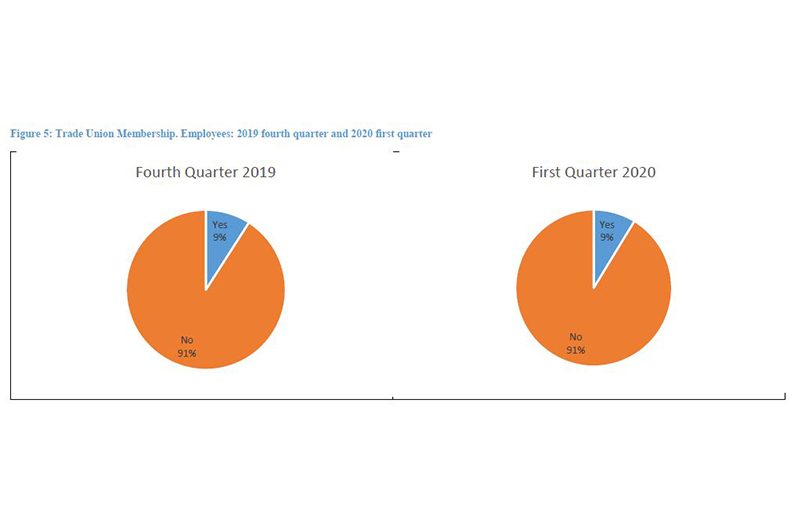By Tamica Garnett

NOTWITHSTANDING more than 50 per cent of the persons who make up Guyana’s workforce having only primary level education or less, just nine per cent of employees in Guyana are covered by a trade union, according to data compiled by the Bureau of Statistics.
Veteran trade unionists believe that the low level of coverage has much to do with employees being intimidated by employers not to join trade unions.
“You have a lot of employers in this country where even though you have an Act [law] in place, they are doing a lot of things to scare the employees off of joining the unions,” indicated Seepaul Narine, General Secretary of the Guyana Agricultural Workers Union (GAWU).
Narine has over 30 years as a trade union representative, and is also Treasurer of the Federation of Independent Trade Unions in Guyana (FITUG), one of two umbrella trade union bodies in Guyana. The other umbrella body is the Guyana Trade Union Congress (GTUC).
Narine noted that in many cases, the employees are too afraid to come forward, as they may face termination or discrimination for openly declaring their desire to join a union.
“Many employees would wish to have a union, but once they know their jobs could be in jeopardy because the employer don’t want a union, then the protection of their jobs come first, and they would pull back,” said Narine.
He said the Ministry of Labour (MoL) must do more to prosecute those employers who are discovered to be coercing employees against joining a trade union.
In Guyana, trade unions are covered by law under the Trade Unions Act Chapter 98:03, and it is against the law for any employer to prevent or dissuade any employee from joining a trade union.
As organisations that look after the rights of workers, trade unions are considered an important component for employees, as it provides protection to employees against the exploitation of their employers.
“When you don’t have trade union coverage, the employer could walk on you; they could do you anything. When you have protection by the union, then the employer has to think twice about the treatment they mete out to employees,” Narine explained.
According to the Bureau’s 2020 first-quarter Labour Force Survey report, the workforce in Guyana comprises a total of 264,862 employed persons, but only some 15, 000 are covered under the protection of a trade union.
This statistics represents little change in the situation since the Bureau first began the Survey in 2017, when it was discovered at that time that just 10 per cent of employees were covered by a trade union.
Chief Labour Officer, Charles Ogle also agrees that unions play an important role, and help to make the labour landscape easier for the employees.
LESS GRIEVANCES AND DISPUTE

primary level education or below (Photo credit: Guyana Labour Force Survey 2020 First Quarter Report)
“I would glad for the workers to be unionized; it would be less grievances and dispute. If they are unionized, they are protected, and would have somebody to speak for them. They would have some amount of security in that representation,” Ogle shared.
Ogle oversees employer/employee disputes when reports are made to the MoL. Essentially, the MoL provides a safety net for unrepresented employees, providing an avenue for individual employees to lodge complaints. However, when a union is in place, the employees are represented collectively.
Minister of Labour Joseph Hamilton, however, offers a different look at the situation, as to what he believes is responsible for the low representation of employees by trade unions. He posited that the situation is exacerbated by the need for more proactive effort from the trade unions.
In Guyana, joining a trade union is voluntary, and Hamilton believes that the unions are not doing enough to attract the employees.
ISSUE OF TRUST

“Trade unions, over the decades, have played a dedicated, vibrant role, representing workers’ interest, but the issue is that they [employees] don’t trust them [trade unions],” the minister said.
He added: “At the end of the day, if people don’t have confidence in their leadership, they will not want to become part of the trade union, so the onus is on the trade union to reinvent themselves. What worked for [Hubert Nathaniel] Critchlow and so can’t work now; it’s a different workforce, and they are yet to learn that. That is why trade unions are suffering, and they will continue to suffer.”
He contended that the issue may be one of not just the lack of representation for workers, but also a matter of who the workers get to represent them. The minister noted that there is a need for the injection of fresh blood into the trade union representatives, as opposed to the many longstanding members that currently exist.
“Trade unions have done themselves a disservice by having leaders who have taken over for the unions, and see it as if they own it,” the minister said.
“Trade unions are not replenishing leadership; people are there for decades, even though unproductive, even though not serving the trade unions, they still have themselves there in all kinds of positions. The leadership has these dinosaurs that hold on to the union, so it is for the union… They have to change, if they don’t, they will become extinct like the dinosaurs.”
Narine agreed that there is need for more proactive effort from the trade unions.
“The trade union movement needs to strengthen itself, and be more aggressive in terms of looking at membership. They need to be more relevant in society; that is a bad comment as a trade unionist, but that is the fact. Unions need to be vibrant; vigilant, and need to represent their members,” Narine concurred.




.png)









